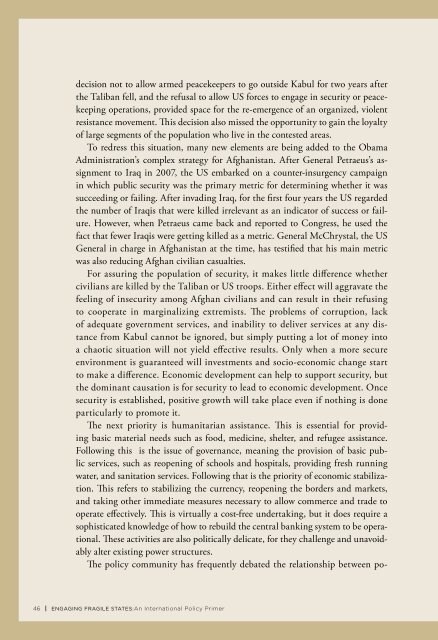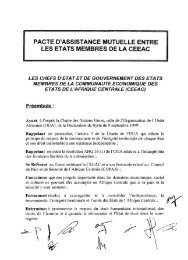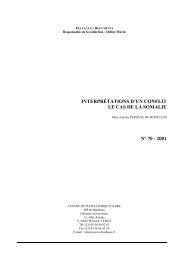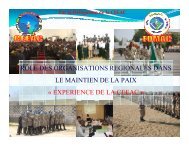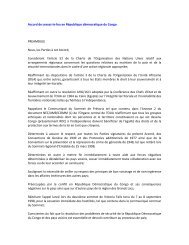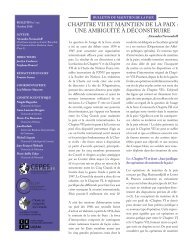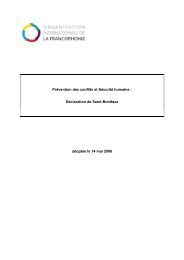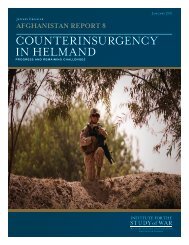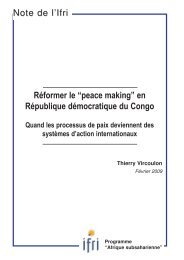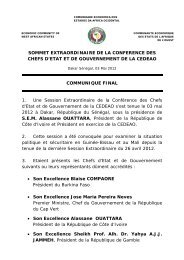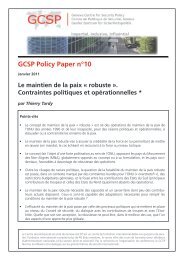engaging fragile states - Woodrow Wilson International Center for ...
engaging fragile states - Woodrow Wilson International Center for ...
engaging fragile states - Woodrow Wilson International Center for ...
You also want an ePaper? Increase the reach of your titles
YUMPU automatically turns print PDFs into web optimized ePapers that Google loves.
decision not to allow armed peacekeepers to go outside Kabul <strong>for</strong> two years after<br />
the Taliban fell, and the refusal to allow US <strong>for</strong>ces to engage in security or peacekeeping<br />
operations, provided space <strong>for</strong> the re-emergence of an organized, violent<br />
resistance movement. This decision also missed the opportunity to gain the loyalty<br />
of large segments of the population who live in the contested areas.<br />
To redress this situation, many new elements are being added to the Obama<br />
Administration’s complex strategy <strong>for</strong> Afghanistan. After General Petraeus’s assignment<br />
to Iraq in 2007, the US embarked on a counter-insurgency campaign<br />
in which public security was the primary metric <strong>for</strong> determining whether it was<br />
succeeding or failing. After invading Iraq, <strong>for</strong> the first four years the US regarded<br />
the number of Iraqis that were killed irrelevant as an indicator of success or failure.<br />
However, when Petraeus came back and reported to Congress, he used the<br />
fact that fewer Iraqis were getting killed as a metric. General McChrystal, the US<br />
General in charge in Afghanistan at the time, has testified that his main metric<br />
was also reducing Afghan civilian casualties.<br />
For assuring the population of security, it makes little difference whether<br />
civilians are killed by the Taliban or US troops. Either effect will aggravate the<br />
feeling of insecurity among Afghan civilians and can result in their refusing<br />
to cooperate in marginalizing extremists. The problems of corruption, lack<br />
of adequate government services, and inability to deliver services at any distance<br />
from Kabul cannot be ignored, but simply putting a lot of money into<br />
a chaotic situation will not yield effective results. Only when a more secure<br />
environment is guaranteed will investments and socio-economic change start<br />
to make a difference. Economic development can help to support security, but<br />
the dominant causation is <strong>for</strong> security to lead to economic development. Once<br />
security is established, positive growth will take place even if nothing is done<br />
particularly to promote it.<br />
The next priority is humanitarian assistance. This is essential <strong>for</strong> providing<br />
basic material needs such as food, medicine, shelter, and refugee assistance.<br />
Following this is the issue of governance, meaning the provision of basic public<br />
services, such as reopening of schools and hospitals, providing fresh running<br />
water, and sanitation services. Following that is the priority of economic stabilization.<br />
This refers to stabilizing the currency, reopening the borders and markets,<br />
and taking other immediate measures necessary to allow commerce and trade to<br />
operate effectively. This is virtually a cost-free undertaking, but it does require a<br />
sophisticated knowledge of how to rebuild the central banking system to be operational.<br />
These activities are also politically delicate, <strong>for</strong> they challenge and unavoidably<br />
alter existing power structures.<br />
The policy community has frequently debated the relationship between po-<br />
46 | Engaging Fragile States:An <strong>International</strong> Policy Primer


